增值再生PET扩链改性研究进展
IF 11.9
2区 化学
Q1 POLYMER SCIENCE
引用次数: 16
摘要
塑料焚烧引起的全球环境问题不断增加,对聚对苯二甲酸乙二醇酯(PET)的需求也在不断增加,到2020年,PET的需求量为2700万吨。因此,PET回收已成为全球循环经济的核心。特别是PET的回收方法分为机械回收和化学回收两种途径,其中机械回收比化学回收效率更高。然而,PET在机械回收过程中会发生热致降解,如分子量(MW)和粘度的降低。因此,需要可行的方法来克服这些挑战。本文详细介绍了用伸链挤压法对PET进行机械回收的工艺过程。因此,综述了各种扩链剂(CEs)对再生PET (rPET)性能和反应挤出工艺的影响。此外,基于各种ce对rPET性能的影响,我们详细介绍了用于PET回收的反应挤出法的最新进展。本文章由计算机程序翻译,如有差异,请以英文原文为准。
Chain-Extending Modification for Value-Added Recycled PET: A Review
Abstract The global environmental issues caused by plastic incineration are continuously increasing, along with the demand for polyethylene terephthalate (PET)—27 million metric tons of PET was demanded in 2020. Therefore, PET recycling has emerged as the core of the global circular economy. In particular, PET recycling methods are categorized into two pathways: mechanical and chemical recycling, wherein mechanical recycling is more efficient than chemical recycling. However, PET undergoes heat-induced degradations during mechanical recycling such as reduction in molecular weight (MW) and viscosity. Therefore, feasible methods are required to overcome such challenges. This article details the mechanical recycling process of PET using a chain-extending extrusion method. Accordingly, various chain extenders (CEs) were reviewed to identify their effects on recycled PET (rPET) properties and reactive extrusion processes. Moreover, we detailed the recent progress in the reactive extrusion method used for PET recycling based on the effects of various CEs on rPET properties.
求助全文
通过发布文献求助,成功后即可免费获取论文全文。
去求助
来源期刊

Polymer Reviews
工程技术-高分子科学
CiteScore
24.80
自引率
0.80%
发文量
21
审稿时长
6 months
期刊介绍:
Polymer Reviews is a reputable publication that focuses on timely issues within the field of macromolecular science and engineering. The journal features high-quality reviews that have been specifically curated by experts in the field. Topics of particular importance include biomedical applications, organic electronics and photonics, nanostructures, micro- and nano-fabrication, biological molecules (such as DNA, proteins, and carbohydrates), polymers for renewable energy and environmental applications, and interdisciplinary intersections involving polymers.
The articles in Polymer Reviews fall into two main categories. Some articles offer comprehensive and expansive overviews of a particular subject, while others zero in on the author's own research and situate it within the broader scientific landscape. In both types of articles, the aim is to provide readers with valuable insights and advancements in the field of macromolecular science and engineering.
 求助内容:
求助内容: 应助结果提醒方式:
应助结果提醒方式:


